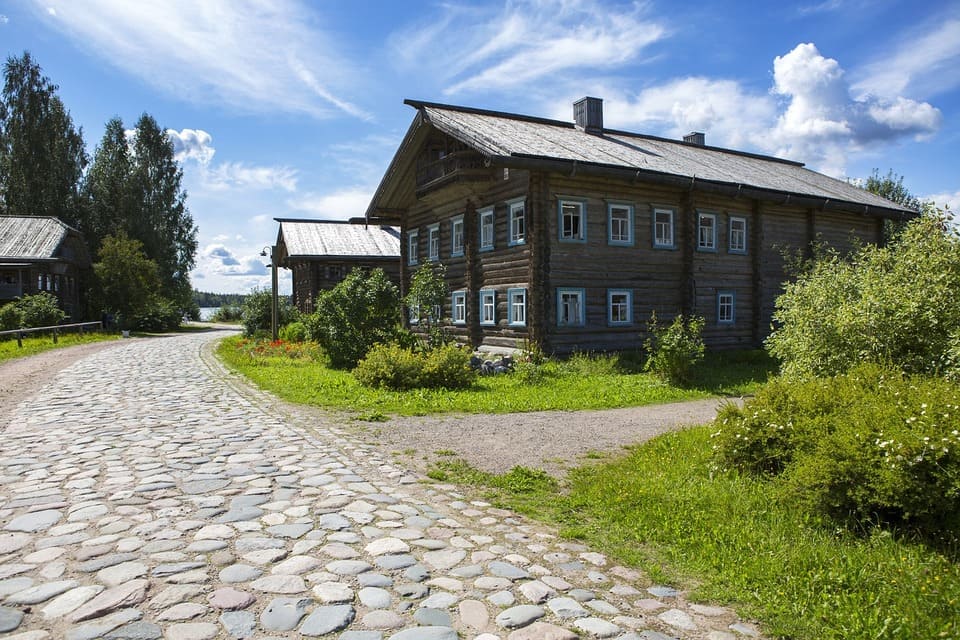
Voices of Russia: A Symphony of Languages and Ethnicity
Step into the vast and diverse world of Russia, where expansive landscapes meet a rich history and a captivating linguistic panorama. This article takes you on a journey through the most spoken languages and the intricate web of ethnic groups, exploring the remarkable linguistic diversity that defines this Eurasian giant. Join us in uncovering the symphony of languages that contributes to the cultural richness of Russia.
Russia’s official language - Russian
Russian, the most prominent language in Russia, serves as the lingua franca for communication, administration, education, and media throughout the country. With over 258 million speakers, it is the most widely spoken language in Russia and the Commonwealth of Independent States (CIS). Russian is an Indo-European language belonging to the East Slavic branch and uses the Cyrillic script. The history of the Russian language is intertwined with the rich tapestry of Russian culture and history, making it an essential aspect of national identity.
The Most Spoken Languages of Russia
Russia, the largest country in the world, is a land of immense diversity, not only in terms of geography and culture but also in its linguistic landscape. With a territory that spans eleven time zones and encompasses various ethnic groups, it is no surprise that Russia is home to a wide array of languages. While Russian is the official language and the most widely spoken one, numerous other languages thrive within its borders. Here we we will explore the most spoken languages of Russia, shedding light on the linguistic richness that characterizes this vast nation.
- Tatar - A Turkic language, is one of the most widely spoken minority languages in Russia. It is primarily spoken by the Tatar ethnic group, concentrated in the Republic of Tatarstan. With around 5.5 million speakers, Tatar holds significant cultural and historical importance in Russia. The language has its unique script based on the Latin alphabet.
- Bashkir - Another Turkic language, is spoken by the Bashkir ethnic group, primarily in the Republic of Bashkortostan. With over 1.5 million speakers, it is one of the larger minority languages in Russia. The Bashkir language uses a modified version of the Cyrillic script.
- Chuvash - Chuvash, yet another Turkic language, is spoken by the Chuvash people, primarily in the Chuvash Republic. It boasts over 1.6 million speakers and has a Cyrillic-based script.
- Ukrainian - An East Slavic language, is spoken by the Ukrainian minority in Russia, particularly in regions bordering Ukraine. Although the number of Ukrainian speakers in Russia is relatively small compared to other languages, it holds cultural significance for the Ukrainian community.
- Chechen - A Northeast Caucasian language, is spoken by the Chechen people in the Chechen Republic. With approximately 1.4 million speakers, it is an integral part of Chechen culture and identity. The language uses a unique script known as the Chechen Cyrillic alphabet.
- Avar - Avar, another Northeast Caucasian language, is spoken by the Avar people in the Republic of Dagestan. It has around 1.1 million speakers and plays a vital role in the cultural heritage of the region.
- Tajik - A Persian language, is spoken by the Tajik ethnic group in the Republic of Tajikistan and some parts of Russia, particularly in the Moscow region. It has approximately 900,000 speakers in Russia and uses the Cyrillic script.
- Armenian - Armenian is spoken by the Armenian minority in Russia, with a significant presence in cities like Moscow and Krasnodar. The number of Armenian speakers in Russia is estimated to be around 1.1 million.
- German - The language is spoken by Russian Germans, descendants of German-speaking immigrants who settled in Russia centuries ago. While the number of German speakers has significantly declined over the years, there are still communities where the language is used, especially in cultural contexts.
- Yakut (Sakha) - That language, also known as Sakha, is a Turkic language spoken by the Yakut people in the Sakha Republic (Yakutia) in eastern Siberia. It is a vital part of Yakut culture and has around 450,000 speakers.
- Mongolian - Mongolian is spoken by the Buryat people in the Republic of Buryatia, which is located in Siberia near the Mongolian border. With approximately 300,000 speakers, it reflects the influence of neighboring Mongolia.
- Other Languages - Beyond these prominent languages, Russia is home to numerous other regional and minority languages, including but not limited to Kazakh, Uzbek, Ossetian, Karelian, Mari, Mordvin, and Udmurt. These languages represent the cultural diversity that thrives within the country.
Linguistic Groups Represented in Russia
Spanning across multiple time zones and regions, Russia is home to a multitude of linguistic groups, reflecting its multicultural and multiethnic society. In this comprehensive exploration, we delve into the linguistic groups represented in Russia, highlighting the rich tapestry of languages that contribute to the country's unique cultural identity.
Russia’s National Language
Before delving into the various linguistic groups, it's essential to recognize the central role of Russian - Russia’s national language. Russian, an Indo-European language belonging to the East Slavic branch, serves as the official and most widely spoken language in Russia. With over 258 million speakers, it acts as the lingua franca for communication, administration, education, and media throughout the country.
Turkic Languages
One of the most significant linguistic groups in Russia is the Turkic language. These languages belong to the Turkic language family and are primarily spoken in the southern regions of Russia. Some notable Turkic languages include:
Tatar - Tatar is a Turkic language spoken primarily by the Tatar ethnic group in the Republic of Tatarstan. With around 5.5 million speakers, it is one of the most widely spoken minority languages in Russia.
Bashkir - Bashkir is another Turkic language, spoken by the Bashkir ethnic group in the Republic of Bashkortostan. It boasts over 1.5 million speakers.
Uralic Languages
The Uralic languages are another prominent linguistic group in Russia, primarily found in the Ural Mountains and western Siberia. Some notable Uralic languages include:
Komi - Komi is a Uralic language spoken by the Komi people in the Komi Republic. It has around 300,000 speakers.
Mari - Mari is another Uralic language spoken by the Mari people in the Mari El Republic. It boasts around 500,000 speakers.
Northeast Caucasian Languages
The Northeast Caucasian languages, also known as Nakh-Dagestanian languages, are indigenous to the North Caucasus region. Russia is home to several of these languages, including:
Chechen - Chechen is a Northeast Caucasian language spoken by the Chechen people in the Chechen Republic. It has approximately 1.4 million speakers.
Avar - Avar is another Northeast Caucasian language, spoken by the Avar people primarily in the Republic of Dagestan. It has around 1.1 million speakers.
Iranian Languages
Several Iranian languages are spoken by various linguistic groups in Russia, especially in the southern regions. Some notable Iranian languages include:
Ossetian - Ossetian is an Iranian language spoken by the Ossetian people in North Ossetia-Alania. It has around 500,000 speakers.
Tajik - Tajik, a Persian language, is spoken by the Tajik ethnic group mainly in the Republic of Tajikistan and in some parts of Russia, particularly in the Moscow region. It has approximately 900,000 speakers in Russia.
Caucasian Languages
The Caucasian languages are a diverse group of languages spoken in the Caucasus region, including parts of Russia. These languages include:
Georgian - Georgian is the official language of Georgia, but it is also spoken by the Georgian community in Russia.
Finno-Ugric Languages
The Finno-Ugric languages are part of the Uralic language family and are primarily spoken in the northwest of Russia. Some notable Finno-Ugric languages include:
Finnish - Finnish is the official language of Finland, but there is a Finnish-speaking minority in Russia, particularly in the Karelian Republic.
Estonian - Estonian is the official language of Estonia, but there is also an Estonian-speaking minority in Russia, particularly in the Pskov Oblast.
Slavic Languages
Apart from Russian, there are several other Slavic languages spoken by linguistic groups within Russia:
Ukrainian - Ukrainian is spoken by the Ukrainian minority in Russia, particularly in regions bordering Ukraine.
Belarusian - Belarusian is spoken by the Belarusian minority in Russia, especially in the Smolensk Oblast and other western regions.
Mongolic Languages
The Mongolic languages are spoken by various ethnic groups in Russia, particularly in the Siberian and Far Eastern regions:
Buryat - Buryat is a Mongolic language spoken by the Buryat people in the Republic of Buryatia, near the Mongolian border.
Kalmyk - Kalmyk is another Mongolic language spoken by the Kalmyk people in the Republic of Kalmykia.
Germanic Languages
Russian Germans, descendants of German-speaking immigrants who settled in Russia centuries ago, still speak German. There are also some Mennonite communities in Russia where German is spoken.
Other Languages
Russia is also home to various other languages and dialects, including but not limited to Kazakh, Uzbek, Karelian, Chuvash, Mordvin, Udmurt, and more. These languages represent the diverse ethnic composition of the country and contribute to the rich mosaic of linguistic diversity in Russia.
Translate Languages of Russia with PoliLingua
In a country as linguistically diverse as Russia, effective language translation is not a luxury; it's a necessity. PoliLingu, a global language service provider, simplifies the process of translating documents from any language in Russia. With a commitment to accuracy, quality, and customer satisfaction, PoliLingu has earned its reputation as a trusted partner for individuals, businesses, and organizations seeking language solutions. Whether you're expanding into Russian-speaking markets, connecting with diverse communities, or simply need personal documents translated, PoliLingu is here to serve your needs. Visit their website, upload your document, and receive a free quote. Experience the convenience and reliability of PoliLingu's professional translation services and unlock a world of opportunities in Russia and beyond.
Russia's linguistic landscape is a testament to its rich cultural heritage and multicultural society. While Russian serves as the official language and the dominant means of communication, the presence of numerous other languages reflects the country's complex and diverse history. The linguistic groups represented in Russia add depth and richness to its cultural identity, making it a truly unique and fascinating part of the world where languages have played a pivotal role in shaping its past and present.







